| Portrait | Prime Minister
(Birth–Death) | Term of office | Political party | President(s)
(Term) |
|---|
| Took office | Left office | Time in office |
|---|
|  | Haidar Abu Bakr al-Attas
(born 1939) | 22 May 1990 | 9 May 1994
( deposed.) | 3 years, 352 days | Yemeni Socialist Party | | Ali Abdullah Saleh

(1990–2012) |
|---|
|  | Muhammad Said al-Attar
(1927–2005) | 9 May 1994 | 6 October 1994 | 150 days | Independent |
|---|
|  | Abdul Aziz Abdul Ghani
(1939–2011) | 6 October 1994 | 14 May 1997 | 2 years, 220 days | General People's Congress |
|---|
|  | Faraj Said Bin Ghanem
(1937–2007) | 14 May 1997 | 29 April 1998 | 350 days | Independent |
|---|
|  | Abdul-Karim Al-Iryani
(1934–2015) | 29 April 1998 | 31 March 2001 | 2 years, 336 days | General People's Congress |
|---|
|  | Abdul Qadir Bajamal
(1946–2020) | 31 March 2001 | 7 April 2007 | 6 years, 7 days | General People's Congress |
|---|
|  | Ali Muhammad Mujawar
(born 1953) | 7 April 2007 | 10 December 2011
( resigned.) | 4 years, 247 days | General People's Congress |
|---|
|  | Mohammed Basindawa
(born 1935) | 10 December 2011 | 24 September 2014
( resigned.) [5] | 2 years, 288 days | Independent | | Abdrabbuh Mansour Hadi
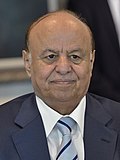
(2012–2022) |
|---|
|  | Abdullah Mohsen al-Akwa
(born 1961) | 24 September 2014 | 9 November 2014 | 46 days | Al-Islah |
|---|
| 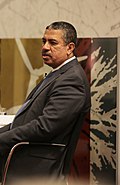 | Khaled Bahah
(born 1965) | 9 November 2014 | 3 April 2016 | 1 year, 146 days | Independent |
|---|
| 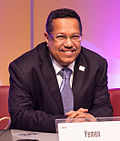 | Ahmed Obaid Bin Dagher
(born 1952) | 4 April 2016 | 15 October 2018 | 2 years, 195 days | General People's Congress |
|---|
|  | Maeen Abdulmalik Saeed
(born 1976) | 18 October 2018 | 5 February 2024 | 5 years, 110 days | Independent |
|---|
| Rashad al-Alimi
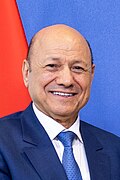
(since 2022) |
|---|
|  | Ahmad Awad bin Mubarak
(born 1968) | 5 February 2024 | 3 May 2025 | 1 year, 87 days | Independent |
|---|
|  | Salem Saleh bin Braik
(born 1965) | 3 May 2025 | 15 January 2026 | 259 days | Independent |
|---|
| | Shaea al-Zindani
(born 1954) | 15 January 2026 | Incumbent | 2 days | Unknown |
|---|
| Houthi Yemen |
|---|
| Supreme Political Council |
|  | Talal Aklan
(born 19??) [a]
( in rebellion ) | 1 March 2016 | 4 October 2016 | 217 days | Yemeni Socialist Party | | Mohammed al-Houthi
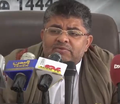
(2015–2016) |
|---|
| 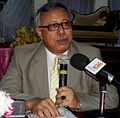 | Abdel-Aziz bin Habtour
(born 1955) [a]
( in rebellion ) | 4 October 2016 | 10 August 2024 | 7 years, 311 days | General People's Congress
(Pro-Houthi faction) | | Saleh Ali al-Sammad
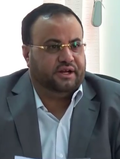
(2016–2018) |
|---|
| Mahdi al-Mashat

(since 2018) |
|---|
|  | Ahmed al-Rahawi
(1950–2025) [a]
( in rebellion ) | 10 August 2024 | 28 August 2025
( killed.) [6] | 1 year, 18 days | General People's Congress
(Pro-Houthi faction) |
|  | Muhammad Ahmed Miftah [a]
(born 1967)
( in rebellion ) | 30 August 2025 | Incumbent | 140 days | Al Haqq |



























